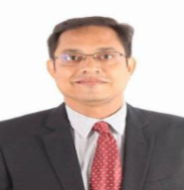
Dr. Siva Ramamoorthy is Professor (Higher Academic Grade) and Former Dean at the
School of Biosciences and Technology, Vellore Institute of Technology (VIT), India. He
earned his undergraduate and postgraduate degrees in plant science from Madurai Kamaraj
University, India. He carried out his PhD in Plant Genetic Diversity at Bharathidasan
University, India. He conducted his postdoctoral research at Ben-Gurion University (Israel)
and Gyeongsang National University (South Korea). Dr. Siva’s research interests are pigment
biotechnology and pigment therapeutics. His works have been acknowledged internationally,
and he is one of the top 2% of scientists in the world, as per Stanford, and Mendeley 2020,
2021, 2022, 2023 and 2024. He holds the 87th rank in Biological Sciences, according to the
2021 World Scientist and University Rankings. He is the recipient of the prestigious
TANSA award 2023. He is also one of the top 1,000 researchers in India, as per Careers 360
(2023). Dr. Siva received a DAAD fellowship in 2024 to work at Johannes Gutenberg
University, Germany. He has been involved in popularizing science in India by organizing
conferences and conducting lecture workshops on various biological aspects, with the support
of the Science Academies of India, since 2009. Dr. Siva has successfully obtained various
national and international research grants, as well as several funded research projects. Dr.
Siva is a member of the IUCN Species Commission for medicinal plants. He was elected as a
Fellow of the Linnean Society (London) in 2013, Fellow of the Royal Society of Biology
(UK) in 2015, and Fellow of the Royal Society of Chemistry (UK) in 2020. He was the
visiting professor at various Universities like Johannes Gutenberg (Germany), University of
Poitiers (France), Chulalangkorn University (Thailand) UPN University (Surabaya,
Indonesia) and CICY (Mexico). He has published more than 200 manuscripts in
reputable peer-reviewed journals, garnering over 6,500 citations, an h-index of 45, and
an i10 index of 133. He is also the author of four books published by CRC, Springer Nature,
and Elsevier. He serves as the Executive Editor of Journal of Ethnopharmacology, Associate
Editor of Phytomedicine, Frontiers in Plant Science, Scientific Reports – Nature, BMC Plant
Biology, BMC Biotechnology, Natural Products and Bioprospecting (Springer Nature), and
Academic Editor of PLoS One and Peer J